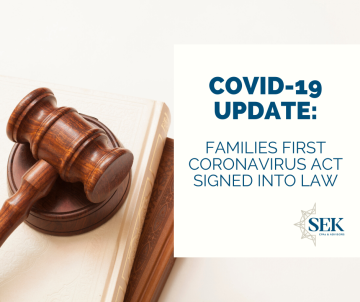Recent News & Blog / Families First Coronavirus Act signed into law

March 21, 2020
Last updated March 22, 2020
The Families First Coronavirus Response Act was signed into law on Wednesday, March 18, 2020. The Act goes into effect on April 2 and will require certain employers to provide paid sick leave and paid family medical leave to employees for COVID-19 related circumstances.
The Act provides the following:
Emergency Paid Sick Leave
Private employers with fewer than 500 employees and government employers with one or more employees are required to provide paid sick leave to employees who cannot work or telework for a number of COVID-19 related reasons as follows:
- Employee is subject to federal, state, or local quarantine or isolation order
- A health care provider has advised employee to self-quarantine
- Employee has symptoms and is seeking a medical diagnosis
- Employee is caring for an individual who is subject to an order as described above or has been advised by health care provider to self-quarantine
- Employee is caring for a son or daughter whose school or place of care is closed, or childcare provider is unavailable
- Employee is experiencing substantially similar conditions as specified by the Secretary of the Department of Health and Human Services in consultation with the Secretaries of Labor and Treasury
Requirements include the following:
- Provides ten workdays of paid leave. This equates to 80 hours for full-time employees and a prorated number of hours (equal to the number of hours employee works on average over a two week period) for part-time employees
- Capped at $511 per day and $5,110 total per employee when leave is taken for employee’s own illness or quarantine and must be paid at employee’s regular rate (as calculated under the Fair Labor Standards Act)
- Capped at $200 per day and $2,000 total per employee per when leave is taken to care for others, for school closures, or for employee experiencing substantially similar conditions and must be paid at two-thirds of the employee’s regular rate of pay
- Not subject to carryover from one year to next and not paid out at termination
- Employer may not require employee to find a replacement and leave is available immediately regardless of how long the employee has been employed
- Employer may not require employee to use other paid leave before using the paid sick leave provided under the Act
- No certification or documentation may be required as a condition of receiving paid sick leave
- The Secretary of Labor will issue a notice within seven days of the enactment that must be posted in conspicuous places where the employer normally posts other such employment notices
- Failure to provide sick leave or retaliation for exercising rights under the Act will be subject to penalties under FLSA
Emergency Family and Medical Leave
Temporarily expands Family Medical Leave Act (FMLA) coverage for school and child care closures associated with COVID-19.
Requirements include the following:
- Employees who have worked for at least 30 calendar days for an employer with fewer than 500 employees are eligible to take up to 12 weeks of job-protected leave
- Entitles employees to take FMLA leave if “the employee is unable to work or telework due to a need to care for the son or daughter under 18 years of age of such employee if the school or place of care has been closed, or the child care provider of such son or daughter is unavailable, due to a public health emergency.”
- The first ten workdays are unpaid, but the employee may decide to use emergency paid sick leave (as provided under the Act), vacation leave, employer-provided paid sick leave or personal leave during this period as may be applicable.
- After ten days, the employer is required to provide paid leave at two-thirds of the employee’s regular rate, not to exceed $200 per day and $10,000 total per employee
- Employers with fewer than 25 employees are not required to reinstate employee if the position held by the employee on leave no longer exists due to economic conditions or other changes in the employer’s operating conditions caused by the coronavirus pandemic, and the employer makes reasonable efforts to restore the employee to an equivalent position.
Exemptions to the Act
The Secretary of Labor has the authority to issue regulations exempting:
- Certain health care providers and emergency responders from the definition of employee
- Small businesses with fewer than 50 employees if the mandate “would jeopardize the viability of a business as a going concern.”
The Act will sunset on December 31, 2020.
Please contact Laura Stover, Human Resources Consultant (lstover@sek.com, 301-733-5020), with any questions on the Families First Coronavirus Response Act or other HR questions.
This article is provided as general guidance. SEK CPAs & Advisors does not render legal advice or opinion.